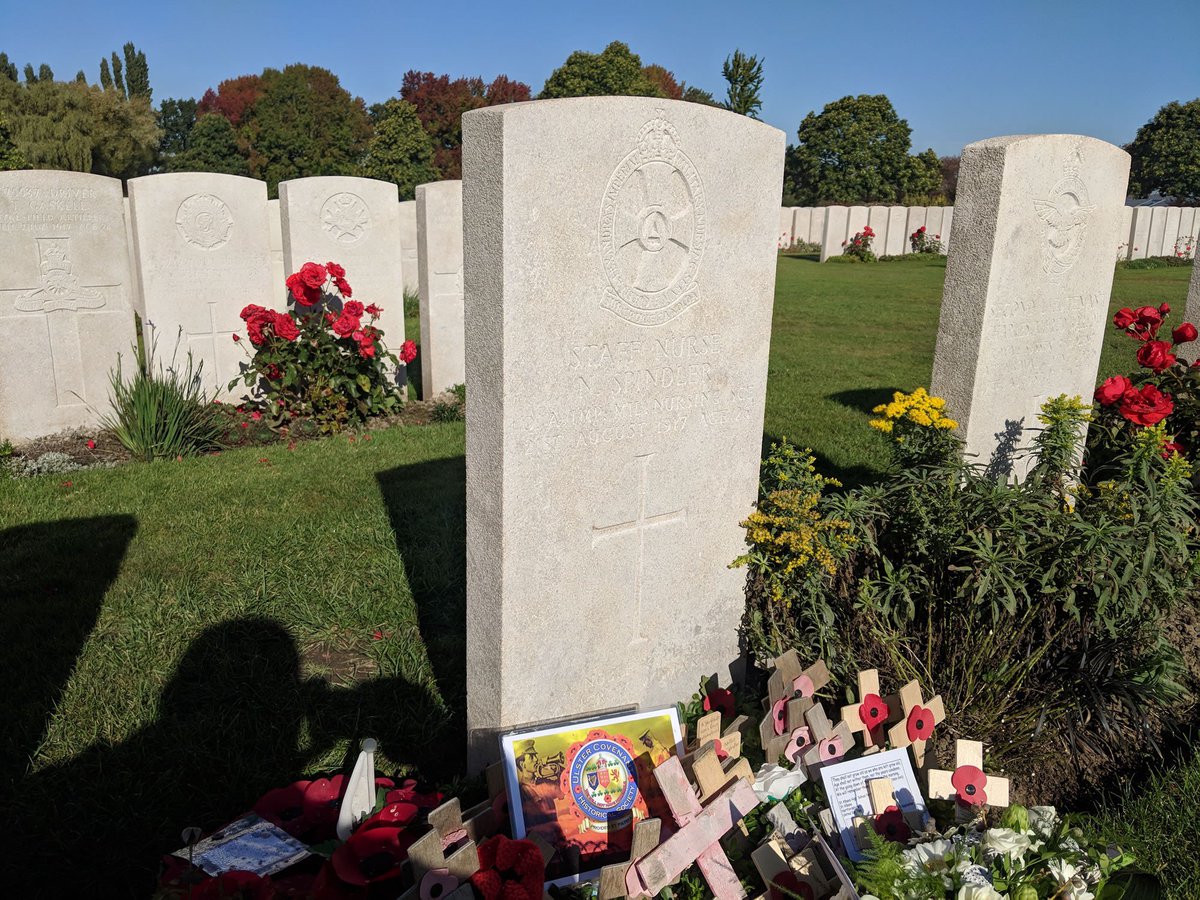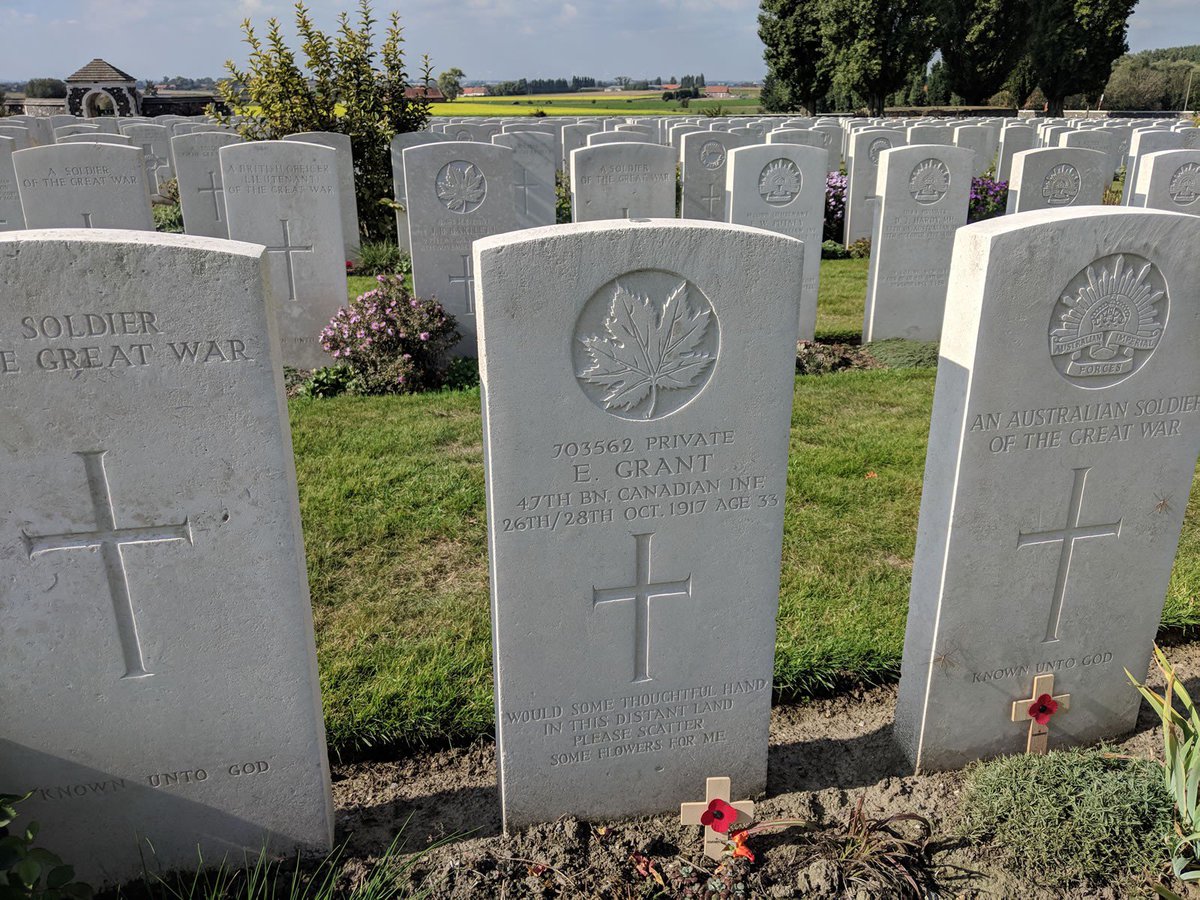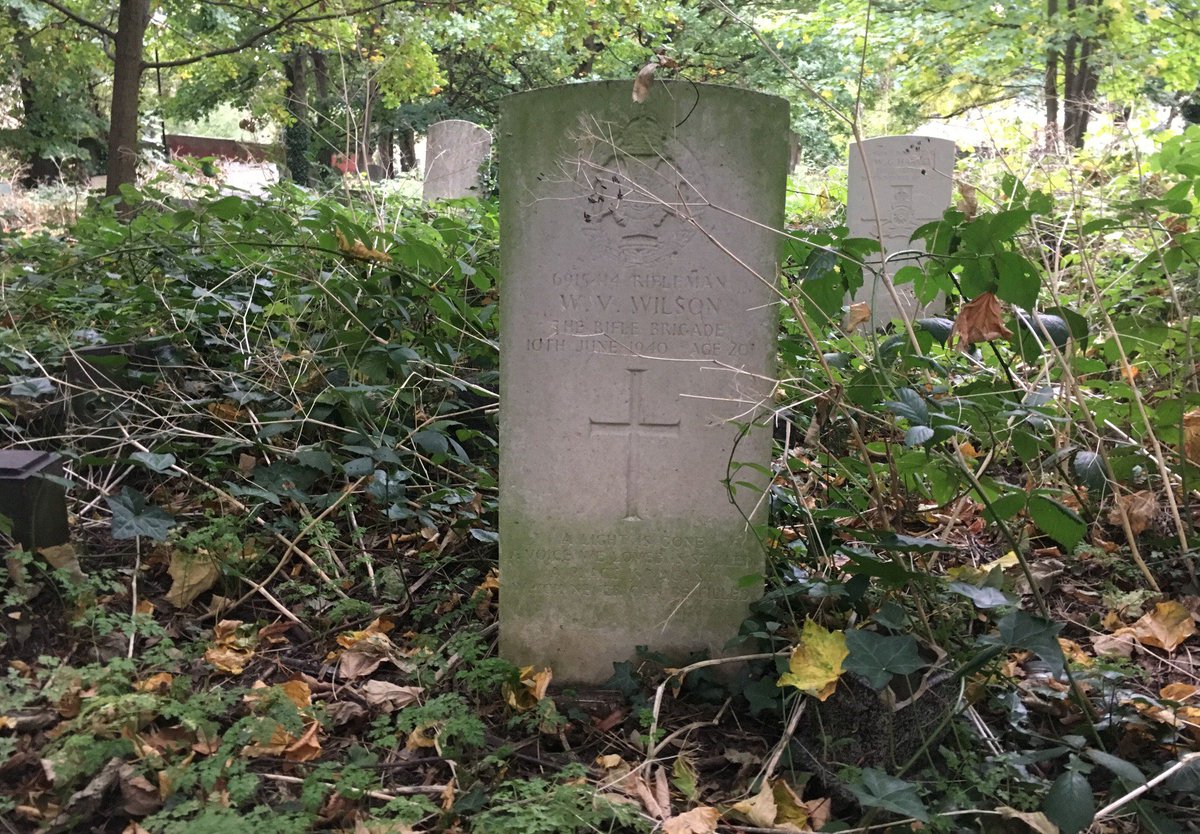Okay. History time!
You've probably seen photos of Commonwealth war cemeteries, with rows of white graves. They're heartbreaking images.
What you DON'T see are the thousands of small, tragic stories on each gravestone.
So I'm going to share some with you here. /1 #history #WW1
You've probably seen photos of Commonwealth war cemeteries, with rows of white graves. They're heartbreaking images.
What you DON'T see are the thousands of small, tragic stories on each gravestone.
So I'm going to share some with you here. /1 #history #WW1

These stories exist because although every stone is similar, family members were able to pay to have a small, custom inscription made on each stone.
Which is why on Pvt J Low's grave you'll find this desperately sad inscription:
"Until we meet again. Mother." /2
Which is why on Pvt J Low's grave you'll find this desperately sad inscription:
"Until we meet again. Mother." /2

Of course, the ABSENCE of anything is even sadder. Too often you'll see the nine saddest words in the English language:
"A soldier of the Great War. Known only unto God"
Those words appear when we know a body is there but not who. It was Rudyard Kipling who came up with them /3
"A soldier of the Great War. Known only unto God"
Those words appear when we know a body is there but not who. It was Rudyard Kipling who came up with them /3

What's extra sad about that is that Kipling lost his son John, aged just 17, at the Battle of Loos.
John shouldn't have been in the army. He was shortsighted. Kipling had used his influence to help him get in.
When Kipling wrote those words, his own son's grave was 'unknown' /4
John shouldn't have been in the army. He was shortsighted. Kipling had used his influence to help him get in.
When Kipling wrote those words, his own son's grave was 'unknown' /4
Our next grave is Second Lieutenant P.E. Coote, from #london. He died aged 24.
"In loving memory of my darling son. Sadly mourned and missed. Mother." /5
"In loving memory of my darling son. Sadly mourned and missed. Mother." /5

Notice the Star of David? This and other graves are a reminder that people of EVERY colour, race, sex and creed died on the Western Front.
Bluntly: If you're the kind of 'Free Tommy' wanker who sees WW1/2 through white-tinted spectacles, then E.A.D. Kemal would like a word. /6
Bluntly: If you're the kind of 'Free Tommy' wanker who sees WW1/2 through white-tinted spectacles, then E.A.D. Kemal would like a word. /6

So would Driver Susai, a Hindu, and I suspect all of his mates - of all colours - in the Royal Horse Artillery.
As would the Chinese Labour Corps members whose graves you can also see in this photo. /7
As would the Chinese Labour Corps members whose graves you can also see in this photo. /7

And yes. I did say sexes. Meet Staff Nurse Nellie Spindler. Ignore the junior title, she was an abdominal specialist. She knew the further forward she operated, the more people would survive
It cost her her life at Passchendaele. She now lies next to the men she tried to save /8
It cost her her life at Passchendaele. She now lies next to the men she tried to save /8

But it's the inscriptions that are so moving. In some cases, they are all we know about these people and the heartbreak their death caused. And if you're left behind, how do you sum up all that pain in so few words?
Private Marshall. Age 20
"Till we meet again. Dad, Mam."
/9
Private Marshall. Age 20
"Till we meet again. Dad, Mam."
/9

Private Harry A King - an American - age unknown
"The best of sons and brothers. Also Reggie, buried close by."
To my knowledge, Reggie is not in the same cemetery (or at least I've never found him). Part of me hopes his family never had to find that out. /11
"The best of sons and brothers. Also Reggie, buried close by."
To my knowledge, Reggie is not in the same cemetery (or at least I've never found him). Part of me hopes his family never had to find that out. /11

And that's the thing. For many families - from all over the world - it was too costly a trip to ever make. Some graves reflect this.
Pvt Grant. Age 33
“Would some thoughtful hand / In this distant land / Please scatter some flowers for me” /12
Pvt Grant. Age 33
“Would some thoughtful hand / In this distant land / Please scatter some flowers for me” /12

It's the inscriptions from wives (and children) that just break me when I see them. Just the thought of that loss. How do you explain to a child what you're writing those words for? What do you tell them?
Pvt Pigg, 28
"Ever remembered by his loving wife and daughter Jessie" /13
Pvt Pigg, 28
"Ever remembered by his loving wife and daughter Jessie" /13

Private A. Fieldhouse. Age 27
"Sweet memory of dadda is a priceless possesion. Ray, Iris, Nana." /15
"Sweet memory of dadda is a priceless possesion. Ray, Iris, Nana." /15

Private Adam Shaw. Age 22
“In loving memory of my dear husband & our dear dada our hero.”
I have seen this gravestone many times in Tyne Cot, Belgium. Every single time it has cut me to the core. /16
“In loving memory of my dear husband & our dear dada our hero.”
I have seen this gravestone many times in Tyne Cot, Belgium. Every single time it has cut me to the core. /16

And this is the thing, I think, that these gravestones always leave you with close up. Just an overwhelming feeling not of sadness, but of almost unbearable loss.
Gunner W.A.G Grindrod. Age 21
“Only one to all the world. But all the world to us, our only son.” /17
Gunner W.A.G Grindrod. Age 21
“Only one to all the world. But all the world to us, our only son.” /17

Pvt Townsend. Age 34
“In loving memory of my dear husband William. No one knows how much I loved you”
Townsend didn't die in battle. He was murdered by the SS after surrendering. His crime? Defending the Dunkirk beaches
Whenever I see this I have to tell my wife I love her /19
“In loving memory of my dear husband William. No one knows how much I loved you”
Townsend didn't die in battle. He was murdered by the SS after surrendering. His crime? Defending the Dunkirk beaches
Whenever I see this I have to tell my wife I love her /19

There's not really a point to this thread. I just think it's something people should know more about. Each of these stones is a story, not just part of a tragic whole.
You can read more about them, and see more examples, in my piece over on @Medium medium.com/@garius/the-th… /20
You can read more about them, and see more examples, in my piece over on @Medium medium.com/@garius/the-th… /20
Hell, you don't even have to go across the sea to find them. There are hundreds of war graves in churches across Britain. Go take a look. Here is one from Walthamstow
W. V. Wilson
"A Light is gone / A voice we loved is stilled / A place is vacant / That can never be filled" /21
W. V. Wilson
"A Light is gone / A voice we loved is stilled / A place is vacant / That can never be filled" /21

I'll leave you though with this one, from Tyne Cot again. It is that of Arthur Conway Young, who can be found in Tyne Cot Cemetery, another victim of the Battle of Passchendaele.
“Born at Kobe, Japan 9th October 1890. Sacrificed to the fallacy that war can end war.” /END
“Born at Kobe, Japan 9th October 1890. Sacrificed to the fallacy that war can end war.” /END

ADDENDUM: Cheers for the positive feedback on this thread. If you like it, don't forget to retweet.
I'm not particularly religious, but I do believe that as long as people see gravestones like these, the people they commemorate - and those they left behind - live on in some way.
I'm not particularly religious, but I do believe that as long as people see gravestones like these, the people they commemorate - and those they left behind - live on in some way.
• • •
Missing some Tweet in this thread? You can try to
force a refresh








